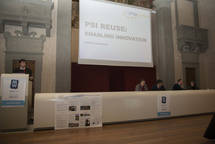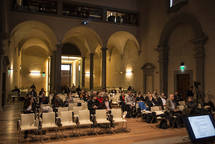Open Access, IPR and management of rights in the digital Cultural Heritage realm

- Two moments of the CreativeCH's workshop
Researchers, students and practitioners from the cultural heritage, museums, libraries and archives fields joined the CreativeCH team at the Museums and the Web Florence (MWF2014) Pre-Conference Session - Horizon2020 and Creative Europe vs Digital Heritage – A European Projects Crossover, held on the 18th February 2014 at Cenacolo di S.Apollonia, Via S.Gallo 25/A, Florence, to discuss and explore the legal issues involving the use and reuse of cultural contents produced by Museums and Libraries, within the reality of today’s participatory and remix culture, and the search for a better balance between public interest and memory institutions entitlement to recognition and economic reward/support, in what concerned open access to data.
The dissemination of knowledge and of the rich cultural and intellectual heritage of Europe are considered by the European Commission (EC), to be key elements for the development and competitiveness of the Knowledge Economy.
The EC strongly encourages the reuse of the cultural contents by cultural and creative industries and academic institutions in order to promote the knowledge and encourage entrepreneurship and creativity in the digital economy. To promote reuse the EC has been upholding initiatives that support open data and open access such as the amendment of DIRECTIVE 2003/98/EC on the re-use of public sector information to include cultural institutions or Europeana Linked Open Data and Licensing Framework. The workshop focused on the consequences of such initiatives for cultural and creative institutions and users, while also exploring innovative open access projects, namely the Rijsstudio.
Joaquim Ramos de Carvalho (UoC) welcomed the audience and briefly introduced himself and the CreativeCH project, providing a context to the workshop. He then proceeded to expose the workshop focus and aims, and present the four guest speakers, explaining how their presentations would bring different perspectives on the workshop theme.
The first presentation was made by Martin Alvarez Espinar, Head of the Advisory Board of the ePSI Platform, who presented the ePSI Platform and discussed the European Directives on Public Sector Information. The ePSI Platform is a one-stop shop on public sector information re-use funded by the European Commission, a website were governments, organizations, businesses and citizen can engage and find information and documentation about the implementation of PSI Directives, best practices example as well as news and an related events agenda. Martin then proceeded to explain the European Directive 2003/98/CE on Public Sector Information (amended by 2013/37/EU to include cultural institutions content), which encourage the Member States to make information held by public sector bodies available for reuse for free or at reproduction cost, and its potential to enable creativity, effectiveness and economic growth. Martin Alvarez Espinar citied some projects already reusing cultural content: Europeana Creative, Museapp and Tijdbalk.
Martijn Pronk, publisher and head of the Publications Department at Rijksmuseum presented the Rijsstudio as a best practice example of open access to cultural heritage collections. In October 2012 Rijksmuseum launched Rijksstudio, a platform which presents over 125,000 high resolution images of objects in the public domain, free for all to browse, collect, share and to download for personal and commercial use. The Rijksstudio has changed the way visitors interact with the Rijksmuseum collection. Based almost exclusively on images, the Riijsstudio brings the public closer to art, permitting the user to create personal collections and share images via social media, as well as manipulate, cut details and creatively re-use the images to make their own masterpieces. The practical result has been the download of 500.000 images and the creation of 130.000 personal collections in Rijksstudio, turning the Rijksmuseum in to a major love brand which as encouraged the living artists in its collections to give permission for the open access to their works.
The third presentation was given by Helena Patrício, Director of the Special Collections Services at the National Library of Portugal (NLP), and reflected on the application of the amended public sector information re-use directive to cultural institutions content underlining issues related to digitisation funding and content / data re-use. NLP’s public domain content available online was briefly characterized and the digital library access statistics were presented showing a massive content consumption, especially since its integration in the Europeana Portal. Using the NLP’s Digital Collection as an example, it was argued that must cultural institutions already make part of their collections and metadata freely accessible online. Problems arise in cases in which it is not clear whether the document is copyright free or not and a rights clearance is needed, since this tends to be an extremely complex and time consuming process. It was made clear that at present most libraries have no capacity to support rights clearance processes, living large parts of its collection inaccessible online.
To conclude, Helena Patricio made an overview of digitisation strategies showing that Public-Private Partnerships, if well negotiated, can be extremely advantageous.
Finally Julia Fallon, IPR & Policy Advisor for Europeana, presented Europeana Rights policy and vision, which has played an important role in creating standards and guidelines for the legal use and redistribution of content. In 2010 Europeana published the Public Domain Charter stating that what is in the Public Domain needs to remain in the Public Domain in its digital version and that the lawful user of a digital copy of a Public Domain work should be free to re-use, copy and modify. Europeana further advanced its commitment to Public Domain collaborating with Creative Commons to create the Creative Commons Public Domain Mark (CC0), a simple mark that indicates that a work is in the public domain and can be re-used by anyone without any restrictions.
Europeana Rights Policy work has focused on the need for mandatory and correct Rights Statements to be displayed as icons alongside search results, since an august 2012 survey has shown 50% of the collection had no rights statement and 38% had the wrong rights statement associated, complicating the reuse of content. By January 2013 a Rights Labeling Campaign was launched which has slowly permitted to correct the situation.
Julia Fallon further discussed the unofficial position of Europeana on the PSI directive, reaffirming Europeana advocacy of the Public Domain Charter, even if PSI Directive permits cultural heritage organizations to impose conditions on the reuse of their digital objects, particularly in the context of a Public – Private Partnerships.
To conclude the workshop, Joaquim Ramos de Carvalho summarized the presentations and discussion main conclusions:
- Open Access, re-use and management of rights in the Digital Cultural Heritage realm are complexes issues, with no right and one-measure-fit-all solution;
- The DIRECTIVE 2013/37/EU on Public Sector Information does not solve the issues faced by cultural institutions and it can create new ones;
- Free Open Access for the user implies costly infrastructure and procedures for the institutions. Questions of resource allocation must be solved.
- Open Access to collections can help maintain the traditional cultural institutions relevant in the digital realm and the participatory/remix culture.
The workshop generated great interest witnessed by the number of attendees (consisting primarily of Cultural & Creative Industries professionals, practitioners from local/regional museums, archives and art institutions, and researchers involved diverse projects within the field of Cultural Heritage) and on the debate generated after the presentations, that continued afterwards during the networking session with many attendees approaching the guest speakers with questions comments.
Workshop Video recap
Workshop Fotos
Download the programme
Meet the Speakers
Helena Patrício - CV and Abstract of the presentation
Martijn Pronk - CV and Abstract of the presentation
Martin Alvarez-Espinar - CV and Abstract of the presentation
Julia Fallon - CV and Abstract of the presentation
Full Workshop Report
Contact us
For more information, registrations and details,
please ask your contact person Ms. Ana Rita Costa
Last Workshop:
New skills and professionalization for the Digital Arena | Dicember 2013




